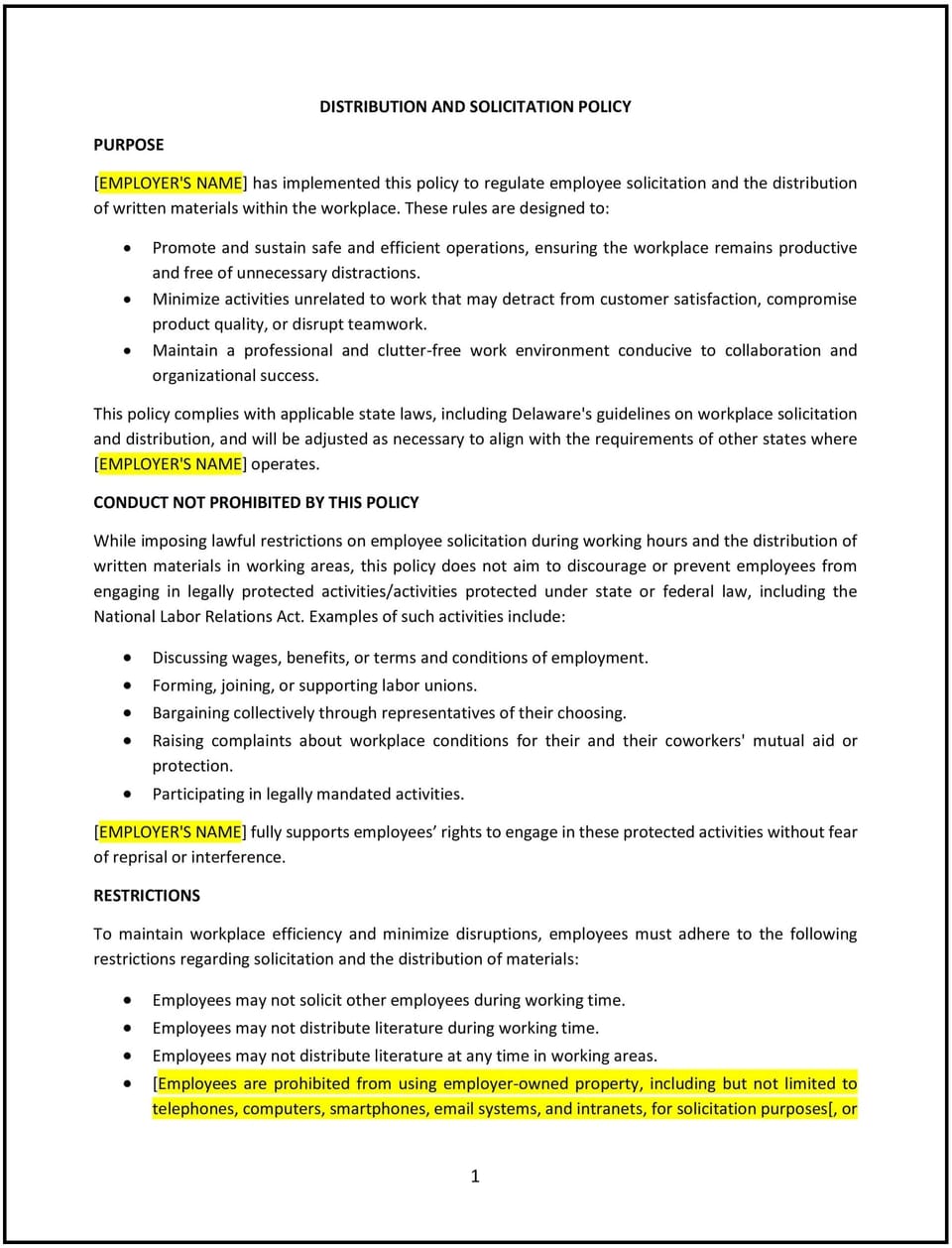Distribution and solicitation policy (Delaware): Free template

Distribution and solicitation policy (Delaware)
A distribution and solicitation policy helps Delaware businesses maintain a productive work environment by setting guidelines for distributing materials and soliciting employees during work hours or on company property. This policy outlines permissible activities, restrictions, and procedures for seeking approval for such activities.
By implementing this policy, businesses can minimize disruptions, ensure workplace focus, and maintain a professional environment.
How to use this distribution and solicitation policy (Delaware)
- Define prohibited activities: Clearly specify the types of distribution and solicitation activities that are not allowed during work hours or on company premises.
- Outline permissible activities: Provide examples of acceptable activities, such as company-sponsored events or charitable initiatives, and the process for gaining approval.
- Establish approval procedures: Explain how employees or external parties can request permission for distribution or solicitation activities, including required documentation and timelines.
- Maintain fairness: Ensure the policy is applied consistently to avoid favoritism or perceived discrimination.
- Address enforcement: Describe how violations of the policy will be handled, including potential disciplinary actions.
- Communicate exceptions: Include any exceptions to the policy, such as union activities protected by Delaware or federal labor laws.
Benefits of using this distribution and solicitation policy (Delaware)
This policy offers several benefits for Delaware businesses:
- Promotes productivity: Minimizes disruptions during work hours, allowing employees to focus on their tasks.
- Ensures professionalism: Creates a respectful workplace by limiting solicitation and distribution activities to appropriate times and locations.
- Reduces conflicts: Establishes clear boundaries to prevent misunderstandings or disagreements related to solicitation or distribution.
- Supports compliance: Aligns with Delaware and federal labor laws to ensure fair treatment of employees.
- Encourages consistency: Provides a standardized approach to managing distribution and solicitation activities across the organization.
Tips for using this distribution and solicitation policy (Delaware)
- Communicate the policy clearly: Ensure all employees and external parties understand the rules and procedures for solicitation and distribution.
- Apply consistently: Enforce the policy uniformly to maintain fairness and prevent favoritism or bias.
- Provide guidance: Train supervisors and managers on how to handle requests and enforce the policy effectively.
- Review regularly: Update the policy to reflect changes in Delaware laws, workplace practices, or industry standards.
- Monitor compliance: Regularly assess how well the policy is being followed and address any issues promptly.
Q: Why is a distribution and solicitation policy important for my business?
A: This policy helps maintain a productive and professional work environment by setting clear boundaries for solicitation and distribution activities, reducing disruptions and conflicts.
Q: What types of activities are prohibited under this policy?
A: Prohibited activities typically include unauthorized distribution of materials, solicitation for personal or commercial purposes, or disruptive activities during work hours.
Q: Are there any exceptions to this policy?
A: Exceptions may include company-sponsored initiatives or union-related activities protected under Delaware or federal labor laws. These exceptions should be clearly outlined in the policy.
Q: How can employees or external parties request approval for solicitation or distribution?
A: Requests should be submitted following the procedures outlined in the policy, which may include providing a written proposal and obtaining managerial approval.
Q: What happens if someone violates this policy?
A: Violations will be addressed according to the policy, which may include disciplinary actions such as warnings or suspension, depending on the severity of the breach.
Q: How often should this policy be reviewed?
A: This policy should be reviewed annually or whenever Delaware laws or workplace practices change to ensure it remains effective and compliant.
This article contains general legal information and does not contain legal advice. Cobrief is not a law firm or a substitute for an attorney or law firm. The law is complex and changes often. For legal advice, please ask a lawyer.


